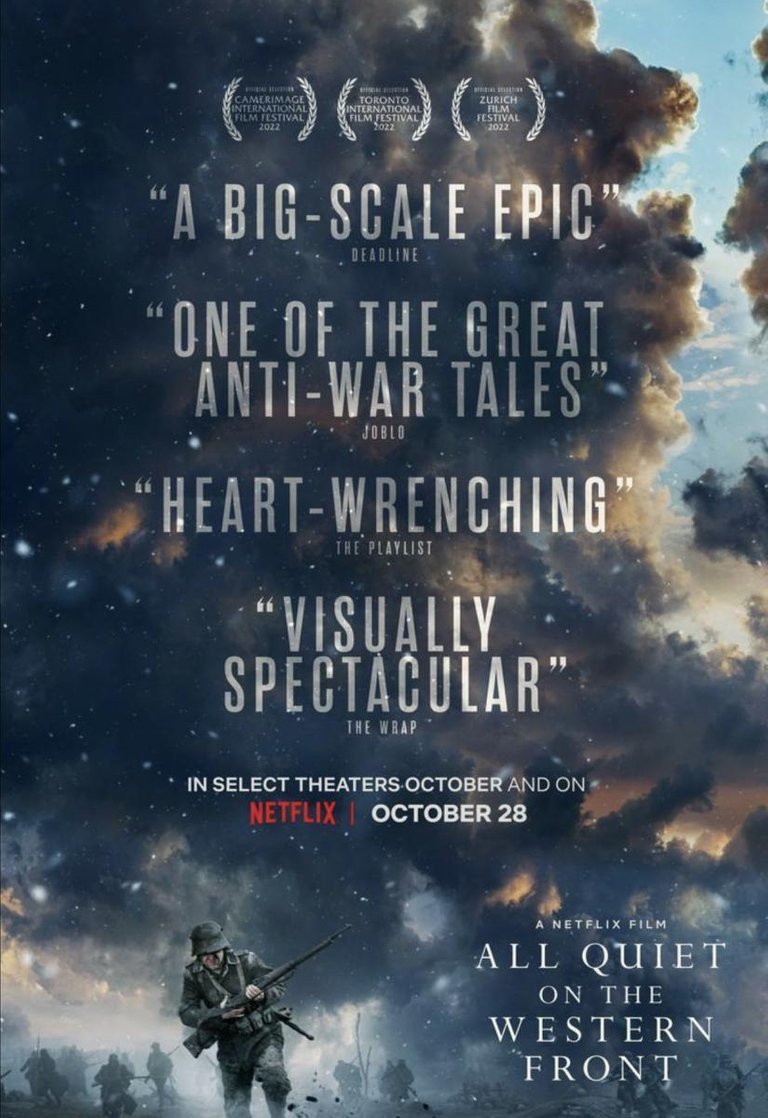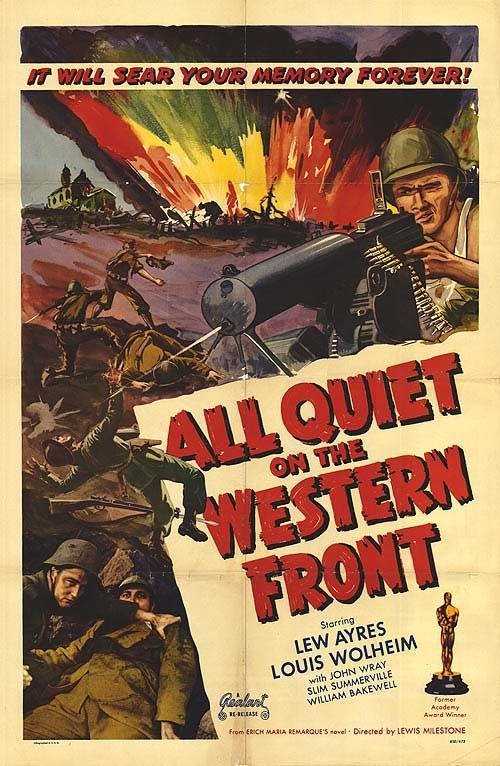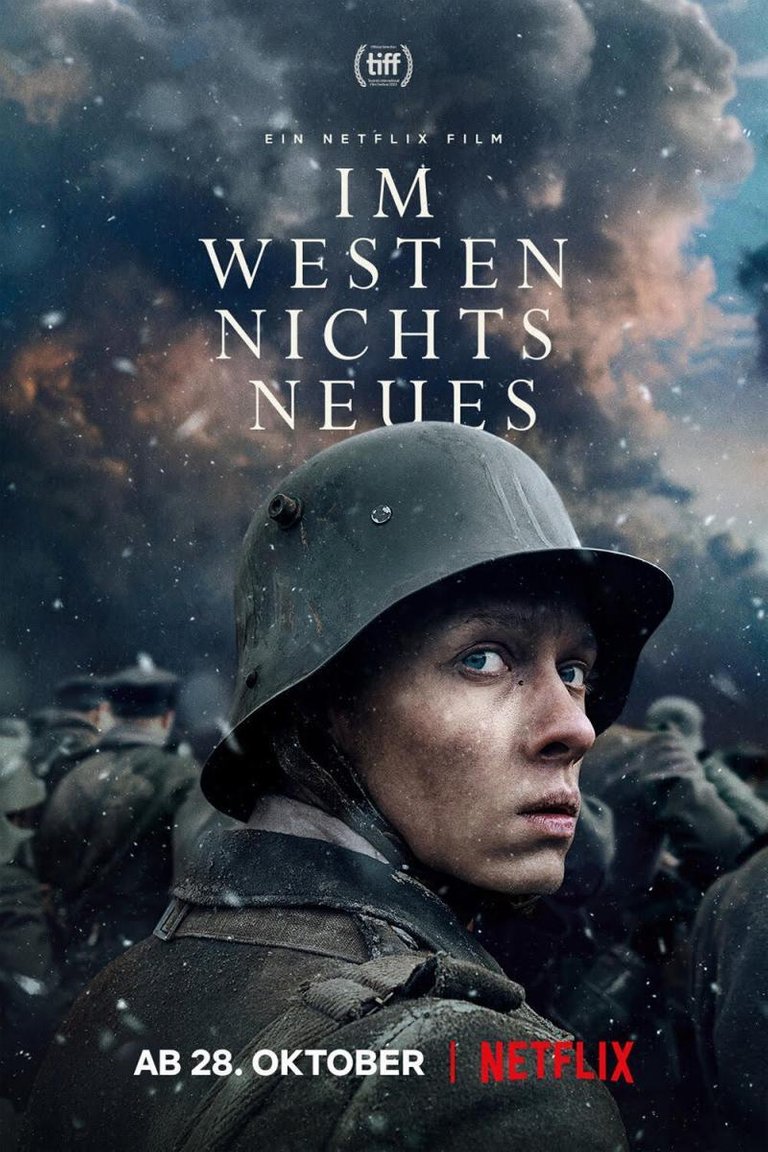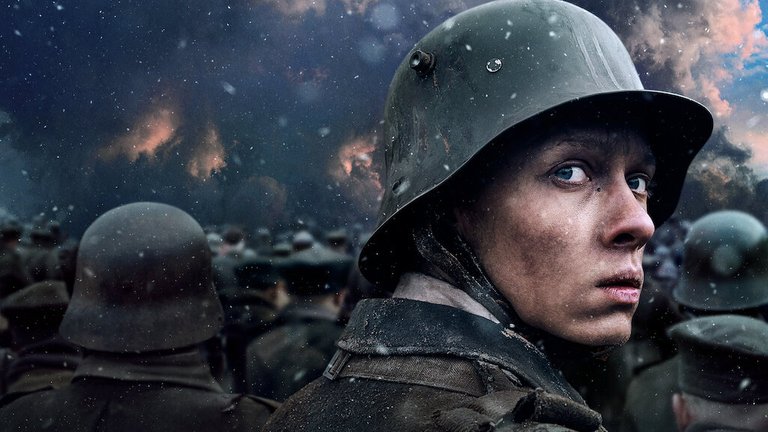
Basado en la novela de 1929
The last war movie to be nominated for a Best Picture Oscar was Sam Mendes' 1917 three years ago. Like that great piece of cinema filmed in one continuous false take, Edward Berger's latest film, All Quiet on the Western Front (Im Westen nichts Neues), has just won the BAFTA for Best Film, but the Next March 12th, will he be able to achieve what 1917 could not and win the night's award?
La última película bélica que estuvo nominada al Oscar a Mejor Película fue 1917 de Sam Mendes hace tres años. Al igual que esa gran obra cinematográfica filmada en una falsa toma continua la última película de Edward Berger, All Quiet on the Western Front (Im Westen nichts Neues), acaba de ganar el BAFTA a Mejor Película, pero el próximo 12 de Marzo, ¿podrá lograr lo que no pudo 1917 y alzarse con el premio de la noche?
War is cruel. All the episodes of armed conflicts that we have suffered as humanity have made us question our humanity; however, the war is also packed with stories that make good movies. One of the harshest and most famous portrayals of World War I is the 1929 novel by the German author Erich Maria Remarque Im Westen nichts Neues, written just a decade after what became known as the Great War and shortly before we witnessed of the atrocities of the World War II, the bloodiest episode of our last hundred years. The fact that a novel written almost a hundred years ago has been adapted three times (twice for the big screen and once for television) and is still a good story shows how well written it was and how little we learn as humanity, because If it's necessary to continue talking about these things, it is so that we do not forget, so that we learn that in war there are no winners and losers, there are only victims, on both sides. I have not had the opportunity to read Remarque's book, but from what I have been able to learn through other people, this film does not cover the entire story told in the novel, although it does cover a large part of the things that Paul lives, the protagonist played on this occasion by Felix Kammerer.
La guerra es cruel. Todos los episodios de conflictos bélicos que hemos sufrido como humanidad nos han hecho cuestionarnos nuestra humanidad; sin embargo, la guerra también está repleta de historias que hacen buenas películas. Uno de los retratos más duros y célebres de la Primera Guerra Mundial es la novela de 1929 del alemán Erich Maria Remarque Im Westen nichts Neues, escrita apenas una década después de lo que se conoció como la Gran Guerra y un poco antes de que fuéramos testigos de las atrocidades de la Segunda Guerra Mundial, el episodio más sangriento de nuestros últimos cien años. El hecho de que una novela escrita hace casi cien años haya sido adaptada tres veces (dos veces para la gran pantalla y una para televisión) y siga siendo una buena historia demuestra lo muy bien escrita que estuvo y lo poco que aprendemos como humanidad, porque si es necesario seguir hablando de estas cosas es para no olvidar, para que aprendamos que en la guerra no hay vencedores y vencidos, sólo hay víctimas, de uno y otro lado. No he tenido la oportunidad de leer el libro de Remarque, pero por lo que he podido conocer a través de otras personas, esta película no abarca la totalidad de la historia contada en la novela, aunque sí gran parte de las cosas que vive Paul, el protagonista interpretado en esta oportunidad por Felix Kammerer.
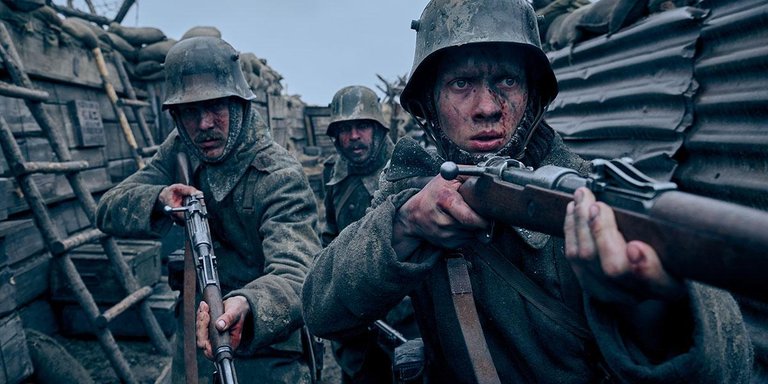
The film begins with a scene moving through the battlefield (which reminded me of 1917), but what I really liked visually at the beginning was the path that the camera takes following the uniforms: once they are removed from the corpses, transported to a barracks, washed and repaired by the seamstresses, the uniforms return to the battlefield covering the body of new soldiers who, animated and eager, march to the battlefront to defend their homeland. Soldiers are nothing more than expendable pieces in a terrible game, fell a thousand? then we send a thousand more. It's a scary idea, but a very well executed cinematic sequence.
La película empieza con una escena en movimiento a través del campo de batalla (que me recordó a 1917), pero lo que realmente me gustó a nivel visual del inicio fue el recorrido que hace la cámara siguiendo los uniformes: una vez removidos de los cadáveres, transportados a un cuartel, lavados y reparados por las costureras, los uniformes vuelven al campo de batalla cubriendo el cuerpo de nuevos soldados que, animados y deseosos, marchan al frente de batalla a defender su patria. Los soldados no son más que piezas prescindibles en un terrible juego, ¿cayeron mil? entonces enviamos mil más. Es una idea aterradora, pero una secuencia cinematográfica muy bien ejecutada.
Paul is a barely a teenager who, along with his friends, feels like going to war. What's more, Paul forges his father's signature on the written permit that he must deliver in order to go to the front. It's all laughs of approval and camaraderie from their friends when they go to enlist and receive their uniforms, but as soon as they arrive on the battlefield, when they enter a trench and the reality of war hits them, the boys are scared and wanting to go back home. Unfortunately, there is no going back. The battle sequences are very good, on par with great war films, and the rain, mud, and inclement weather help add drama to the falling soldiers and how challenging it is to be in a killing situation not to die. In contrast to these scenes with a higher pace and action, there are calmer sequences in some pauses in the conflict and in the scenes in which representatives of the German army are seen negotiating an armistice with their French counterparts. When the war was already lost, what need was there to postpone the armistice and allow thousands more soldiers to die? The First World War, in the end, left a balance of almost 17 million dead. Of all of them, almost 3 million died on the western front that gives its name to the film.
Paul es un apenas un adolescente que, junto a sus amigos, se siente deseoso de ir a la guerra. Es más, Paul falsifica la firma de su padre en el permiso escrito que debe entregar para poder ir al frente. Todo son risas de aprobación y camaradería de sus amigos cuando van al enlistamiento y reciben sus uniformes, pero apenas llegados al campo de batalla, cuando ingresan a una trinchera y la realidad de la guerra los golpea, los chicos se muestran asustados y con ganas de volver a casa. Lamentablemente, ya no hay vuelta atrás. Las secuencias de batalla son muy buenas, a la altura de los grandes largometrajes bélicos, y la lluvia, el lodo y ese clima adverso ayuda a imprimirle mayor dramatismo a los soldados que caen y a lo desafiante que es encontrarse en la situación de tener que matar para no morir. En contraposición a estas escenas de mayor ritmo y acción, hay secuencias más calmadas en algunas pausas que tiene el conflicto y en las escenas en las que se ve a los representantes del ejército alemán negociando un armisticio con sus homólogos franceses. Cuando la guerra ya estaba perdida, ¿qué necesidad había de postergar el armisticio y permitir que murieran miles de soldados más? La Primera Guerra Mundial, al final, dejó un saldo de casi 17 millones de muertos. De todos ellos, casi 3 millones murieron en el frente occidental que da nombre a la película.

All Quiet on the Western Front swept the BAFTAs, taking seven out of fourteen nominations, including film, directing, cinematography, adapted screenplay and sound. For the night of March 12, this German drama has nine nominations (it is the second most nominated film in this edition, only behind Everything Everywhere All at Once which has eleven) and is competing for the Oscar for Best Picture, Best international film (here it competes against Argentina 1985 which already won the Golden Globe), Best Adapted Screenplay (Edward Berger, Lesley Paterson, Ian Stokell were in charge of adapting Remarque's novel), Best Cinematography (James Friend already won the BAFTA with this incredible work), Best Soundtrack (by Volker Bertelmann), Best Production Design (where it has strong rivals), Best Makeup and Hairstyling, Best Sound (but competes with The Batman and Top Gun: Maverick, great contenders) and Best Visual Effects (where he takes on Avatar: the Way of Water). In short, she doesn't have it easy, but I think she'll manage to win a statuette, or will she be the big loser of the night with a record of 0/9? We will have to wait to find out.
All Quiet on the Western Front arrasó en los BAFTA logrando llevarse siete estatuillas de un total de catorce nominaciones, incluyendo película, dirección, fotografía, guión adaptado y sonido. Para la noche del próximo 12 de Marzo, este drama alemán cuenta con nueve nominaciones (es la segunda película más nominada de esta edición, sólo por detrás de Everything Everywhere All at Once que tiene once) y compite por el Oscar a Mejor película, Mejor película internacional (aquí compite contra Argentina 1985 que ya se llevó el Globo de Oro), Mejor guion adaptado (Edward Berger, Lesley Paterson, Ian Stokell fueron quienes se encargaron de adaptar la novela de Remarque), Mejor fotografía (James Friend ya se llevó el BAFTA con este increíble trabajo), Mejor banda sonora (a cargo de Volker Bertelmann), Mejor diseño de producción (en donde tiene fuertes rivales), Mejor maquillaje y peluquería, Mejor sonido (pero compite con The Batman y Top Gun: Maverick, grandes candidatas) y Mejores efectos visuales (en donde se enfrenta a Avatar: the Way of Water). En resumen, no lo tiene fácil, pero creo que logrará llevarse alguna estatuilla, ¿o acaso será la gran perdedora de la noche con un récord de 0/9? Tendremos que esperar para saber.
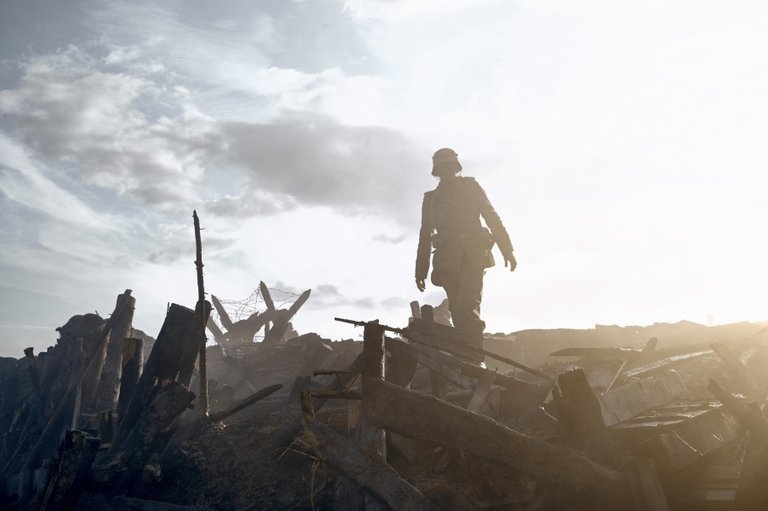
In any case, and whatever happens at the Oscars that night, All Quiet on the Western Front is one of the best war movies I've ever seen. His scenes are raw, cruel, hard, there is a lot of action, but also a lot of emotion. We don't see here the action heroes who face any danger with recklessness and courage; we see human beings, many of them very young, who are almost forced to kill, to flee, to shoot, with the sole objective of surviving. They suffer from hunger, suffer from cold and when it comes to killing, sometimes a shot is not enough, it must be done with a dagger, an ax or with bare hands and the victims do not always die immediately, the agony is prolonged, also tormenting the perpetrator who can't stand the gaze of the dying enemy. A lot of water has flowed under the bridge since the end of World War I and yet, as humanity, we insist on continuing to fight, to continue at war for one reason or another, when the truth is that there is no justification for taking another human being's life. It's true that All Quiet on the Western Front is not a hopeful movie with a happy ending, but sad stories are also necessary to make us think about what we should not repeat. For those who haven't seen it, this movie is available on Netflix, who already saw it? I read you in the comments.
En cualquier caso y pase lo que pase en los Oscars esa noche, All Quiet on the Western Front es una de las mejores películas bélicas que he visto. Sus escenas son crudas, crueles, duras, hay mucha acción, pero también mucha emotividad. No vemos aquí a los héroes de acción que se enfrentan a cualquier peligro con temeridad y valentía; vemos a seres humanos, muy jóvenes muchos de ellos, que se ven casi obligados a matar, a huir, a disparar, con el único objetivo de sobrevivir. Padecen hambre, sufren de frío y a la hora de matar algunas veces no basta un disparo, hay que hacerlo con un puñal, un hacha o con las manos desnudas y las víctimas no siempre mueren de inmediato, la agonía se prolonga atormentando también al victimario quien no soporta la mirada del enemigo moribundo. Mucha agua ha corrido bajo el puente desde que terminara la Primera Guerra Mundial y sin embargo, como humanidad, nos empeñamos en seguir luchando, en seguir en guerra por una u otra razón, cuando la verdad es que no existe justificación alguna para quitarle la vida a otro ser humano. Es cierto que All Quiet on the Western Front no es una película esperanzadora con un final feliz, pero también son necesarias las historias tristes que nos hagan pensar sobre lo que no debemos repetir. Para quienes no la hayan visto, esta película está disponible en Netflix, ¿quiénes ya la vieron? Los leo en los comentarios.
Reviewed by | Reseñado por @cristiancaicedo
Other posts that may interest you | Otros posts que pueden interesarte:
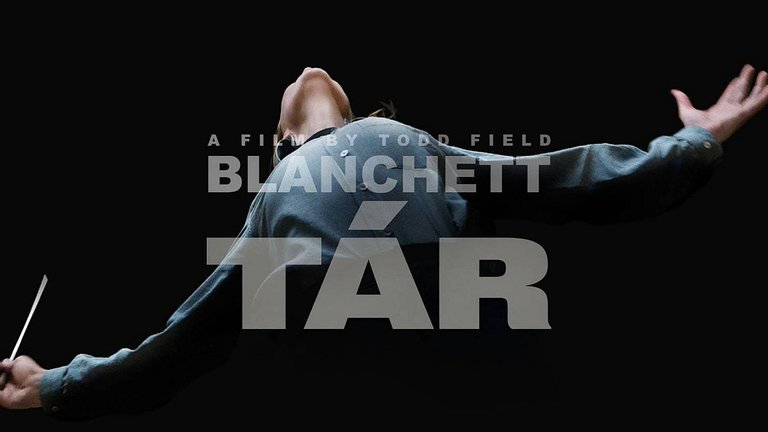   |
|---|

